只能后接不定式的动词和短语
- 格式:doc
- 大小:29.50 KB
- 文档页数:2
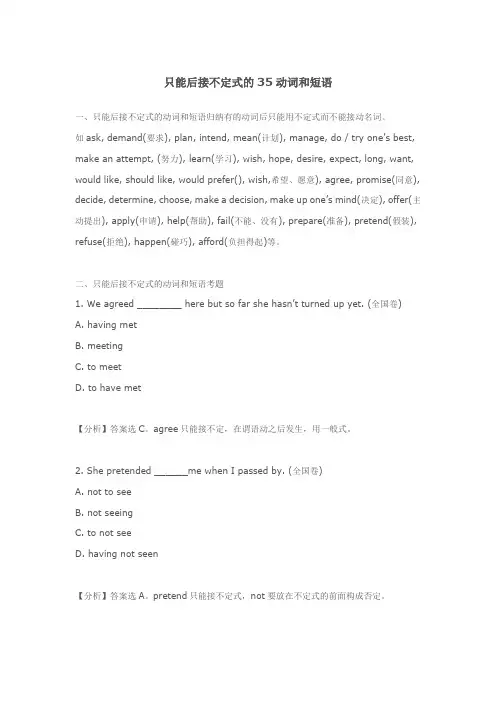
只能后接不定式的35动词和短语一、只能后接不定式的动词和短语归纳有的动词后只能用不定式而不能接动名词。
如ask, demand(要求), plan, intend, mean(计划), manage, do / try one’s best, make an attempt, (努力), learn(学习), wish, hope, desire, expect, long, want, would like, should like, would prefer(), wish,希望、愿意), agree, promise(同意), decide, determine, choose, make a decision, make up one’s mind(决定), offer(主动提出), apply(申请), help(帮助), fail(不能、没有), prepare(准备), pretend(假装), refuse(拒绝), happen(碰巧), afford(负担得起)等。
二、只能后接不定式的动词和短语考题1. We agreed ________ here but so far sh e hasn’t turned up yet. (全国卷)A. having metB. meetingC. to meetD. to have met【分析】答案选C。
agree只能接不定,在谓语动之后发生,用一般式。
2. She pretended ______me when I passed by. (全国卷)A. not to seeB. not seeingC. to not seeD. having not seen【分析】答案选A。
pretend只能接不定式,not要放在不定式的前面构成否定。
只能接-ing形式的35动词和短语一、用法归纳有的动词或短语动词后只能用动名词而不能接不定式。
如allow, permit(允许), consider(考虑), suggest, advice(建议),oman'">), suggest, advice(反复; 不停), finish(完成), imagine(想象), practise(练习), understand(明白), appreciate, enjoy(喜欢), miss(错过; 怀念), prevent(阻止), forbid(禁止), escape(避免), include(包括), forgive, pardon, excuse(原谅), dislike(厌恶), discuss(讨论), report(报道), admit(承认), mind(介意), risk(冒险), can’t stand(不能忍受), burst out(突然开始), feel like(想要), insist on(坚持), delay, put off(推迟), give up(放弃), be busy(忙于), be worth(值得)等。

不定式省略 to 的九种情况不定式省略 to 的九种情况 一、使役动词后省略 to 的情况 在 let, make, have 等使役动词后用作宾语补足语的不定式必须省略 to。
如:My mother wouldn’t let me go to the film. 我妈妈不会让我去看电影的。
I don’t like milk, but mother made me drink it. 我不喜欢牛奶,可是母亲强迫我喝。
I would have him wait for me at the gate of the park. 我要他在公园门口等我。
注意: 1. 当使役动词用于被 动语态时,要补上在主动语态中省略的 to(主要是指 make,let 和 have 很少用于被动语 态)。
2. force, oblige 等虽然也表示 2. force, oblige“使”,但它们后用作宾语补足语的不 定式必须带 to。
He forced me to go with them. 他迫使我同他们一起去。
如: The police obliged him to leave. 警方强迫他离开。
二、感觉动词后省略 to 的情况 在感觉动词后用作宾语补足语的不定式必须省略 to。
如:I watched her get into the car. 我看着她上了车。
I saw the woman enter a bank. 我看见这个女人进了一家银行。
We often hear her sing this song. 我们经常听到她唱这首歌。
Did you notice her leave the house? 她离开屋子你注意到了吗?注意: 这里所说的感觉动词主要包括 see, 1. hear, observe, notice, feel, watch 等。
但是它们用于被动语态时,其后的不定式必须带 to。
如:The woman was seen to enter a bank. 有人看见这个女人进了一家银行。
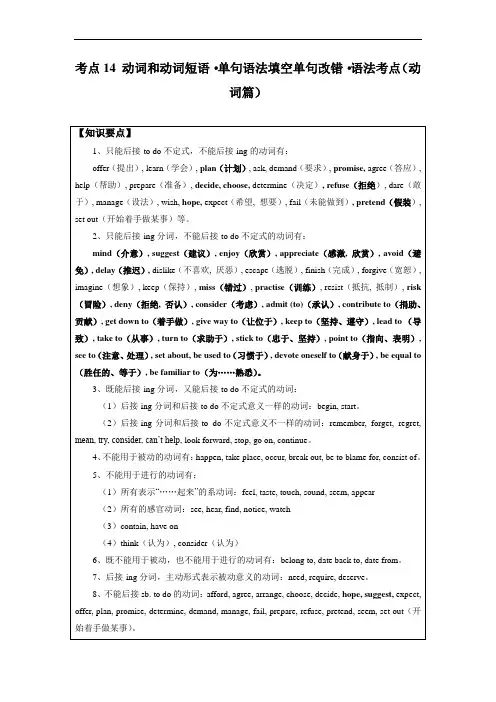
考点14 动词和动词短语·单句语法填空单句改错·语法考点(动词篇)【考题14】单句语法填空。
1. The pen writes ______ (smooth).2. All the passengers must remain ______ (seat) until the bus has stopped completely.3. Remember ______ (turn) off the lights before you leave.4. Do you remember ______ (see) me before?5. We have been reading books for ten minutes. Let’s stop ______ (have) a rest.6. Having finished the exercises, we went on ______ (learn) the new words in the unit.7. After a short rest,they went on ______ (work).8. He stopped ______ (talk) when the bell rang.9. While working, he stopped ______ (talk) to with Tom at times.10. I try not ______ (think) about that.11. Would you please try ______ (do) that again?12. I mean ______ (change) it for another one.13. Missing the train means ______ (wait) for another hour.14. Please permit me ______ (say) a few words.15. We don’t permit ______ (smoke) here.16. These group of people are those who aren’t allowed ______ (enter) the room17. The room needs ______ (clean).18. The book deserves ______ (read).19. I prefer ______ (walk) to school every day.20. I prefer ______ (stay) at home today.21. We began ______ (do) that job last year.22. When the teacher came into the room,he was starting ______ (write) to his parents.23. Hearing the news,he started ______ (think) of a good way to solve the problem.24. We were about to leave when it began ______ (rain).25. I am so busy these days,so I can’t help ______ (decorate) your house.26. I can’t help ______ (laugh) when I see his funny clothes.27. Look forward ______ (avoid) running into any car.28. I am looking forward to ______ (receive) your letter.KEYS:1. smoothly2. seated3. to turn4. seeing5. to have6. to learn7. working8. talking9. to talk 10. to think 11. doing 12. to change 13. waiting 14. to say 15. smoking 16. to enter17. cleaning/ to be cleaned 18. reading/ to be read 19. walking 20. to stay21. doing/ to do 22. to write 23. to think 24. to rain25. (to) decorate 26. laughing 27. to avoid 28. receiving考点15 动词的时态和语态·单句语法填空单句改错·语法考点(动词篇)【考题15】单句语法填空。
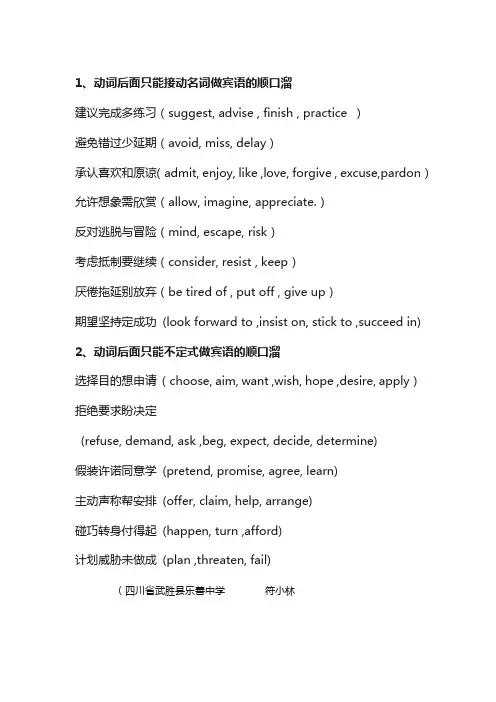
1、动词后面只能接动名词做宾语的顺口溜
建议完成多练习(suggest, advise , finish , practice )
避免错过少延期(avoid, miss, delay)
承认喜欢和原谅(admit, enjoy, like ,love, forgive , excuse,pardon)允许想象需欣赏(allow, imagine, appreciate.)
反对逃脱与冒险(mind, escape, risk)
考虑抵制要继续(consider, resist , keep)
厌倦拖延别放弃(be tired of , put off , give up)
期望坚持定成功(look forward to ,insist on, stick to ,succeed in) 2、动词后面只能不定式做宾语的顺口溜
选择目的想申请(choose, aim, want ,wish, hope ,desire, apply)拒绝要求盼决定
(refuse, demand, ask ,beg, expect, decide, determine)
假装许诺同意学(pretend, promise, agree, learn)
主动声称帮安排(offer, claim, help, arrange)
碰巧转身付得起(happen, turn ,afford)
计划威胁未做成(plan ,threaten, fail)
(四川省武胜县乐善中学符小林。
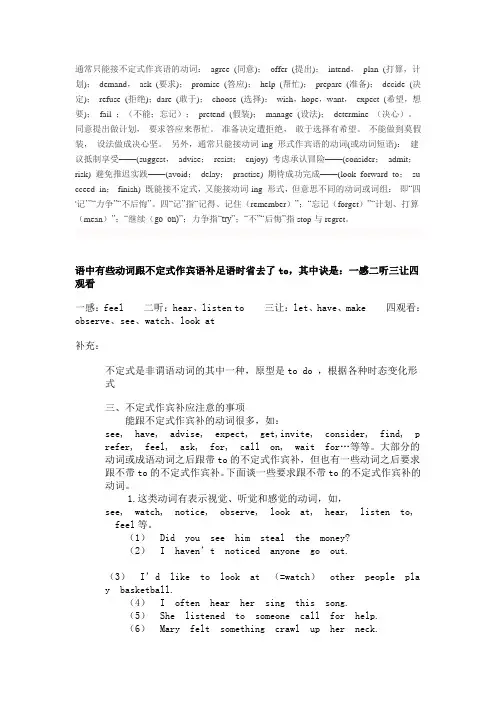
通常只能接不定式作宾语的动词:agree (同意);offer (提出);intend,plan (打算,计划);demand,ask (要求);promise (答应);help (帮忙);prepare (准备);decide (决定);refuse (拒绝);dare (敢于);choose (选择);wish,hope,want,expect (希望,想要);fail ;(不能;忘记);pretend (假装);manage (设法);determine (决心)。
同意提出做计划,要求答应来帮忙。
准备决定遭拒绝,敢于选择有希望。
不能做到莫假装,设法做成决心坚。
另外,通常只能接动词-ing 形式作宾语的动词(或动词短语):建议抵制享受——(suggest,advise;resist;enjoy) 考虑承认冒险——(consider;admit;risk) 避免推迟实践——(avoid;delay;practise) 期待成功完成——(look forward to;su cceed in;finish) 既能接不定式,又能接动词-ing 形式,但意思不同的动词或词组:即“四'记’”“力争”“不后悔”。
四“记”指“记得、记住(remember)”;“忘记(forget)”“计划、打算(mean)”;“继续(go on)”;力争指“try”;“不”“后悔”指stop与regret。
语中有些动词跟不定式作宾语补足语时省去了to,其中诀是:一感二听三让四观看一感:feel 二听:hear、listen to 三让:let、have、make 四观看:observe、see、watch、look at补充:不定式是非谓语动词的其中一种,原型是to do ,根据各种时态变化形式三、不定式作宾补应注意的事项能跟不定式作宾补的动词很多,如:see, have, advise, expect, get,invite, consider, find, prefer,feel, ask, for, call on, wait for…等等。
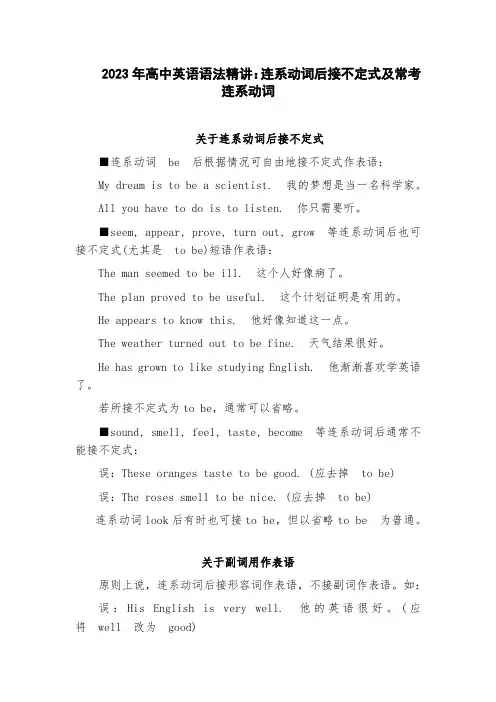
2023年高中英语语法精讲:连系动词后接不定式及常考连系动词关于连系动词后接不定式■连系动词be 后根据情况可自由地接不定式作表语:My dream is to be a scientist. 我的梦想是当一名科学家。
All you have to do is to listen. 你只需要听。
■seem, appear, prove, turn out, grow 等连系动词后也可接不定式(尤其是to be)短语作表语:The man seemed to be ill. 这个人好像病了。
The plan proved to be useful. 这个计划证明是有用的。
He appears to know this. 他好像知道这一点。
The weather turned out to be fine. 天气结果很好。
He has grown to like studying English. 他渐渐喜欢学英语了。
若所接不定式为to be,通常可以省略。
■sound, smell, feel, taste, become 等连系动词后通常不能接不定式:误:These oranges taste to be good. (应去掉to be)误:The roses smell to be nice. (应去掉to be)连系动词look后有时也可接to be,但以省略to be 为普通。
关于副词用作表语原则上说,连系动词后接形容词作表语,不接副词作表语。
如:误:His English is very well. 他的英语很好。
(应将well 改为good)误:Be carefully. 小心点。
(应将carefully 改为careful)误:The soup tastes nicely. 这汤味道不错。
(应将nicely 改为nice)但是,有时连系动词后也可接副词作表语,这主要限于in, on, off, out, away, behind, up, down, over, through, around, round, below, inside, outside 等少数副词小品词以及here, there, upstairs, downstairs 等少数表示地点或方位的副词:Is your mother in? 你母亲在家吗?Everyone is here now. 现在大家都到齐了。
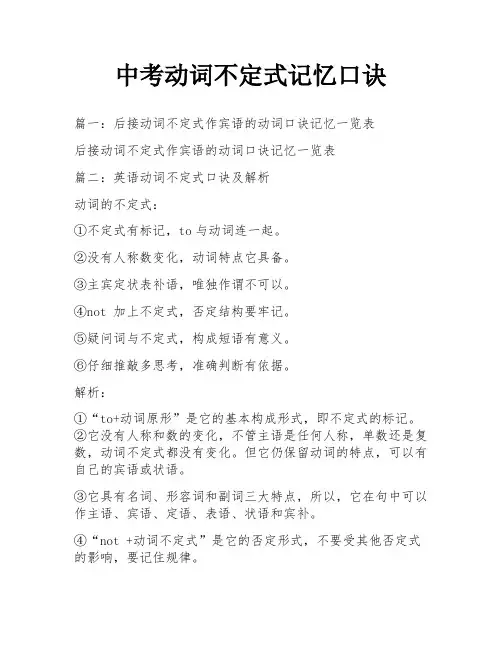
中考动词不定式记忆口诀篇一:后接动词不定式作宾语的动词口诀记忆一览表后接动词不定式作宾语的动词口诀记忆一览表篇二:英语动词不定式口诀及解析动词的不定式:①不定式有标记,to与动词连一起。
②没有人称数变化,动词特点它具备。
③主宾定状表补语,唯独作谓不可以。
④not 加上不定式,否定结构要牢记。
⑤疑问词与不定式,构成短语有意义。
⑥仔细推敲多思考,准确判断有依据。
解析:①“to+动词原形”是它的基本构成形式,即不定式的标记。
②它没有人称和数的变化,不管主语是任何人称,单数还是复数,动词不定式都没有变化。
但它仍保留动词的特点,可以有自己的宾语或状语。
③它具有名词、形容词和副词三大特点,所以,它在句中可以作主语、宾语、定语、表语、状语和宾补。
④“not +动词不定式”是它的否定形式,不要受其他否定式的影响,要记住规律。
⑤疑问代词what, who, whom, which和疑问副词where, when, why , how加上不定式在句中可以做主语,宾语、表语、状语。
⑥通过以上分析,只要仔细研究,把不定式的功能用法搞清楚,在应用时就能作出准确的判断。
动词不定式结构及用法动词不定式在中学英语中应用非常广泛,一方面在句中可起名词、形容词或副词的作用,同时也可在句中作主语、宾语、定语、状语和宾语补足语。
动词不定式的形式一般是to +动词原形,但to有时要省去。
而动词不定式在具体运用时用不用to,取决于谓语动词的用法。
现就以下几方面介绍如下。
一、不定式结构1. 带to的不定式结构能直接跟带to的不定式结构的动词主要有:want, ask, tell, hope, learn, try, decide, forget, remember, like, love, stop, go, e等。
如:I want to go to the movies with you.我想跟你一起去看电影。
Don’t forget to turn off thelight before you leave.在你离开之前别忘了关灯。

only to do sth. 和only doing sth.only to do sth. 表示一个与主语愿望相反的或出乎主语预料的结果,或用来暗示最初的未能实现的动作。
only doing sth. 表示谓语动词本身的动作造成的结果。
For nearly three hours we waited for the decision, only to be told to come again the next day.He died, only leaving nothing but debts. She tried to be friendly to him, only to be shouted at again. 她想要对他友好,没想到他却再次冲她大喊大叫。
状语only doing sth 与only to do sth的区别比较“only+现在分词(短语)”和“only+不定式(短语)”:这两个结构在句中都可以用来表示结果。
但有区别:后接现在分词往往表示一种自然的合乎逻辑的结果,而后接不定式往往表示一种出乎意料的或令人失望的结果。
如:He went out of the room with few clothes on, only feeling rather cold. 他出去时衣穿得很少,渐渐地感到有些冷了。
I arrived at the shop only to find I’d left all my money at home. 我到商店却发现钱全放在家里。
He lifted a rock only to drop it on his own feet. 他搬起石头砸了自己的脚。
I arrived at the shop only to find I'd left all my money at home. 我到商店却发现钱全落在家了。
His opposition served only to strengthen our resolve. 他一反对反而增强了我们的决心。
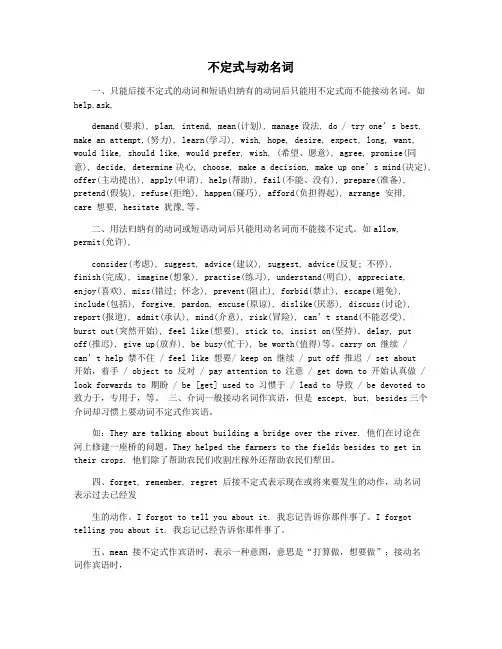
不定式与动名词一、只能后接不定式的动词和短语归纳有的动词后只能用不定式而不能接动名词。
如help,ask,demand(要求), plan, intend, mean(计划), manage设法, do / try one’s best, make an attempt,(努力), learn(学习), wish, hope, desire, expect, long, want, would like, should like, would prefer, wish, (希望、愿意), agree, promise(同意), decide, determine决心, choose, make a de cision, make up one’s mind(决定), offer(主动提出), apply(申请), help(帮助), fail(不能、没有), prepare(准备), pretend(假装), refuse(拒绝), happen(碰巧), afford(负担得起), arrange 安排,care 想要, hesitate 犹豫,等。
二、用法归纳有的动词或短语动词后只能用动名词而不能接不定式。
如allow,permit(允许),consider(考虑), suggest, advice(建议), suggest, advice(反复; 不停),finish(完成), imagine(想象), practise(练习), understand(明白), appreciate, enjoy(喜欢), miss(错过; 怀念), prevent(阻止), forbid(禁止), escape(避免), include(包括), forgive, pardon, excuse(原谅), dislike(厌恶), discuss(讨论), report(报道), admit(承认), mind(介意), risk(冒险), can’t stand(不能忍受),burst out(突然开始), feel like(想要), stick to, insist on(坚持), delay, putoff(推迟), give up(放弃), be busy(忙于), be worth(值得)等。
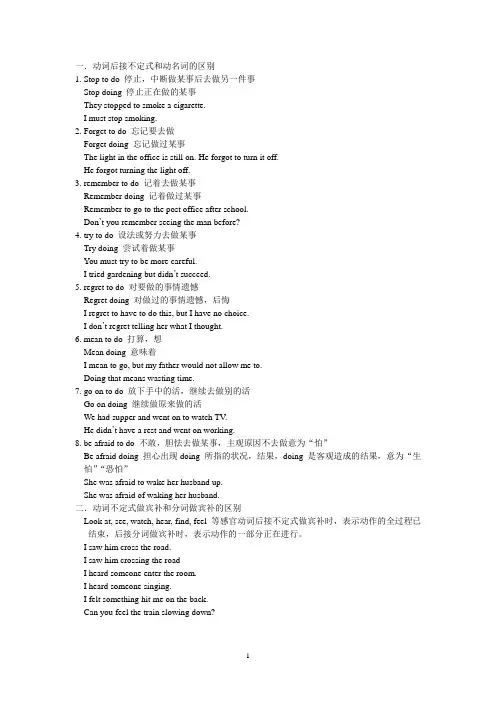
一.动词后接不定式和动名词的区别1. Stop to do 停止,中断做某事后去做另一件事Stop doing 停止正在做的某事They stopped to smoke a cigarette.I must stop smoking.2. Forget to do 忘记要去做Forget doing 忘记做过某事The light in the office is still on. He forgot to turn it off.He forgot turning the light off.3. remember to do 记着去做某事Remember doing 记着做过某事Remember to go to the post office after school.Don’t you remember seeing the man before?4. try to do 设法或努力去做某事Try doing 尝试着做某事You must try to be more careful.I tried gardening but didn’t succeed.5. regret to do 对要做的事情遗憾Regret doing 对做过的事情遗憾,后悔I regret to have to do this, but I have no choice.I don’t regret telling her what I thought.6. mean to do 打算,想Mean doing 意味着I mean to go, but my father would not allow me to.Doing that means wasting time.7. go on to do 放下手中的活,继续去做别的活Go on doing 继续做原来做的活We had supper and went on to watch TV.He didn’t have a rest and went on working.8. be afraid to do 不敢,胆怯去做某事,主观原因不去做意为“怕”Be afraid doing 担心出现doing 所指的状况,结果,doing 是客观造成的结果,意为“生怕”“恐怕”She was afraid to wake her husband up.She was afraid of waking her husband.二.动词不定式做宾补和分词做宾补的区别Look at, see, watch, hear, find, feel 等感官动词后接不定式做宾补时,表示动作的全过程已结束,后接分词做宾补时,表示动作的一部分正在进行。

不定式和动词-ing 形式都可以作宾语,现总结一些技巧和口诀: 1.通常只能接动词-ing 形式作宾语的动词(或动词短语):建议抵制享受——(suggest, advise; resist; enjoy) 考虑承认冒险——(consider; admit; risk) 避免推迟实践——(avoid; delay; practise)期待成功完成——(look forward to; succeed in; finish) 2.通常只能接不定式作宾语的动词:agree (同意); offer (提出); intend, plan (打算,计划); demand, ask (要求); promise (答应); help (帮忙); prepare (准备); decide (决定); refuse (拒绝);dare (敢于); choose (选择); wish,hope,want, expect (希望,想要); fail ;(不能;忘记); pretend (假装); manage (设法); determine (决心)。
同意提出做计划,要求答应来帮忙。
准备决定遭拒绝,敢于选择有希望。
不能做到莫假装,设法做成决心强。
3.既能接不定式,又能接动词-ing 形式,但意思不同的动词或词组:即“四'记’”“力争”“不后悔”。
四“记”指“记得、记住(remember)”;“忘记(forget)”“计划、打算(mean)”;“继续(go on)”;力争指“try”;“不”“后悔”指stop与regret。
[跟踪练习]请翻译下列句子,并用心体会动词不定式和动词-ing 形式的不同含义。
1. The doctor tried to cure the woman of her illness, so he tried treating her with a new medicine.2. The teacher asked us to go on reading the text instead of going on to do the exercises.3. What a poor memory! I forgot borrowing money from him yesterd ay. But today I forgot to return the money to him again.4. When the teacher said angrily, “Stop talking, children”, the pupils stopped to write their compositions.5. I regretted to tell him that he had been dismissed. To my surprise, he said to me, “I am not sad, I only regret having taken the wrong jo b.”6. — Remember to return the bat to me. — But I remember hav ing returned it to you.1.医生千方百计来治这位妇女的病,为此他尝试用一种新药来为她治疗。
英语中的实意动词后面常见搭配就是不定式t o d o和d o i n g-CAL-FENGHAI.-(YICAI)-Company One1英语中的实意动词后面常见搭配就是不定式to do和doing。
①其后只能加to do的动词24个;②其后只能加doing 的动词28个;③其后既可加to do又可加doing的动词8个(含义发生变化);① 只能加 to do 的动词1. want to do sth. 想要做某事I want to buy a new computer this afternoon.我想今天下午买台新电脑。
2. would like to do sth.想要做某事I would like to invite you to come to my birthday party this Saturday.我想邀请你这周六来我的聚会。
3. wish to do sth. 希望做某事I wish to live on the moon one day.我希望有一天在月球上生活。
4. help to do sth. 帮助做某事I often help to do some chores at home.我在家经常帮着做家务。
5. hope to do sth. 希望做某事I hope to have a good rest this weekend.我希望这周末好好休息一下。
6. learn to do sth. 学会做某事He finally learned to play the piano with the help of the teacher.在老师的帮助下,他最终学会了弹钢琴。
7. manage to do sth. 设法做成某事They managed to escape the fire yesterday.昨天他们设法逃脱了火灾。
8. offer to do sth. 主动提出做某事Never offer to teach fish to swim.别在强人面前逞能。
后面加ing的动词用法归纳:有的动词或短语动词后只能用动名词而不能接不定式。
如allow, permit(允许), consid er(考虑), sugges t, advice(建议), sugges t, advice(反复; 不停), finish(完成), imagin e(想象), practi se(练习), unders tand(明白), apprec iate, enjoy(喜欢), miss(错过; 怀念), preven t(阻止), forbid(禁止), escape(避免), includ e(包括), forgiv e, pardon, excuse(原谅), dislik e(厌恶), discus s(讨论), report(报道), admit(承认), mind(介意), risk(冒险), can’tstand(不能忍受), burstout(突然开始), feel like(想要), insist on(坚持), delay,put off(推迟), give up(放弃), be busy(忙于), be worth(值得)等。
高中阶段能接-i ng分次作宾语的常见动词:mind(介意), sugges t(建议), enjoy(欣赏,), admit(承认), apprec iate(感激,欣赏), avoid(避免), delay(推迟), dislik e(不喜欢,厌恶), escape(逃脱), finish(完成), forgiv e(宽恕), imagin e(想象), keep (保持), miss(错过), practi se(训练), resist(抵抗,抵制), risk (冒险), deny(拒绝,否认), consid er(考虑)等。
英语教材里后接动名词和不定式作宾语的动词一、有些动词只能接不定式做宾语。
例如:help,hope,ask,refuse,decide,promise,wish,pretend,expect,learn,plan,manage,agree,fail,offer,happen,seem等等。
例如:He refused to speak on the radio.二、有些动词或短语只接动名词做宾语:mind,finish,enjoy,suggest,consider,miss,keep(on),avoid避开,躲开,stand(忍受),allow ,practicegive up,put off,look forward to期待,期望,feel like想要做某事,prevent…from,阻止can't help禁不住,不由自主迫不及待,be/get used to ,be worth doing,be busy doing例如:His wife doesn't allow smoking inside the room and often advised him to give up smoking.I'm looking forward to hearing from you soon.She doesn't feel like eating anything,being ill for a few days.三、有些动词后面既可接不定式,又可接动名词,其意义基本相同,区别不大。
如;like,love,hate,prefer.begin,start.注意:begin和start本身为进行时,或后面动词为心理变化意义的动词时,须接不定式。
例如:When we came in, they were beginning to have supper.After his explanation, I began to understand it / realize that I was wrong.四、有些词后面既可以接不定式.亦可接动名词,但其意义有很大区别,须特别注意:A.remember,forget,接动名词,表示完成意义(=having done),接不定式,表示将来意义:例如:Please remember to bring me the book I want next time. I remember seeing her(=having seen her) somewhere before.B.mean:mean to do=want to do打算,想要……;mean doing:意味着,就是例如:I am sorry, I didn't mean to hurt your feelings,Learning a foreign languagedoesn't mean just working in class.C.stop:stop to do停下来,要干另一件事,不定式作目的状语;stop doing停止干……,动名词作宾语。
动词不定式作宾语★动词不定式是一种非谓语动词形式,其结构为“to+动词原形”,其中to不是介词,而是动词不定式的符号,称为小品词,动词不定式没有人称和数的变化;动词不定式和其后面的名词等构成动词不定式短语,在句子中可以作主语、表语、补足语、定语、状语等;今天我们重点学习后接动词不定式作宾语的常见动词;1.动词+ 不定式Want hope decide agree choose would like plan fail上列动词只能用动词不定式作宾语举例:The driver failed to see the other car in time.司机没能及时看见另一辆车;I happen to know the answer to your question.我碰巧知道你那道问题的答案;I decided to go to the countryside on vacation.我决定去农村度假;2.动词+疑问词+不定式Know ask show teach think guess find out understand上列动词或短语后可用疑问词加动词不定式短语结构举例:Please teach me how to play the piano.请教我怎么弹钢琴;I must think what to do next.我必须考虑下一步做什么;3.动词+不定式∕动名词Like love begin start上列动词后既可以接动词不定式也可以接动名词形式,意义上差别不大举例:I like singing, but I don’t like to sing now.我喜欢唱歌,但是我现在不想唱歌;Stop forget remember try上列动词后面既可以接不定式也可以接动名词,但是意义上有差别Stop to do sth 表示停下来做某事Stop doing sth 表示停止做某事I’m tired. Let’s stop to have a rest.我累了,让我们停下来休息一下It’s time for class. Stop talking.到上课的时间了,别说话了Forget to do sth 忘记做某事Forget doing sth 忘记做过某事Don’t forget to close the door不要忘记关门I forgot telling you that before.我忘记以前告诉过你这件事了Remember to do sth 记住做某事Remember doing sth 记住做过某事了We must remember to turn off the TV.我们一定要记住关上电视I remembered sending you some letters.我记得给你寄了信了Try to do sth 设法做某事下了点决心还没做Try doing sth 尝试做某事只是试试看I must try to make a cake.I tried to making a cake but failed.4.动词+it+形容词+动词不定式Find think feel上列动词后+it+形容词+动词不定式,其中it为形式宾语,动词不定式为真正的宾语举例:I find it difficult to learn English.我发现学习英语很难练习题用所给词的适当形式填空1.We have planned ___________make a school radio program.2.Do you know when_________ start the party3.I find it very interesting ___________talk with foreigners.4.She’s thinking about __________makea phone call to her parents.5.What bad weather I hate ____________go out on cloudy days.6.Do you really enjoy _________play the violin every day.7.My parents asked me _________do my homework on time.8.I’m really sorry . I forgot __________close the door before I left.9.I didn’t want my parents ___________worry about me , but I’m afraid _________stayat homealone.10.I hate to hear people __________talk loudly in public.11.Betty , we need __________make a plan.12.Please remember ______________post the letter for the old man.13.Stop ___________chat, everyone. Our English teacher is coming.14.He hates__________cook meals . He enjoys ___________havelunch in the restaurant.15.It started__________rain when we were walking in the street last Sunday.。
只能后接不定式的动词和短语
want(想要),wish(希望),ask(要求)tell,intend, mean(计划), manage(设法), learn(学习学会), desire, long(渴望), promise(同意), agree(同意),decide, offer(主动提出), apply(申请), help(帮助), fail(不能、没有), pretend(假装), happen(碰巧),afford (付得起),aim(力求做到), appear(显得),arrange(安排),attempt (试图),care(想要),choose(选择),claim(声称),condescend(屈尊),consent(准许),decide(决定),demand(要求),determine(决心),endeavor(竭力),expect(期待),fail(未履行),help(帮助),hesitate(犹豫),hope(希望),,neglect(疏忽),offer (主动提出),plan(计划),prepare(准备),pretend(假装),proceed(接着做),promise (答应),prove(证明),refuse(拒绝),resolve(解决),seem(觉得好像),swear(发誓),tend(往往会),threaten(预示),undertake(承诺),volunteer(自愿做),vow(发誓),pretend make an attempt, (努力), do / try one’s best,尽力而为,尽最大努力would like, should like, would prefer(宁愿),make up one’s mind(决定), make a decision, (决定)
词后加动名词doing作宾语 V. + doing sth
admit 承认 appreciate 感激,赞赏喜欢avoid 避免 complete 完成 consider 认为考虑delay 耽误 deny 否认 detest 讨厌 endure 忍受stand 忍受enjoy 喜欢 escape 逃脱 prevent阻止 fancy 想象 finish 完成 imagine 想象
mind 介意 miss错过、想念 postpone 推迟 practise 训练、练习recall 回忆resent 讨厌 resist 抵抗 resume 继续 risk 冒险suggest/advice 建议face 面对 include 包括understand 理解明白forgive/pardon/excuse 原谅宽恕 keep 继续allow/permit允许consider 考虑prevent阻止forbid禁止escape避免include 包括dislike 厌恶discuss 讨论report 报道admit承认mind 介意risk 冒险can't stand 不能忍受burst out 突然开始feel like 想要insist on 坚持delay/put
off 推迟give up 放弃be busy 忙于be worth 值得advise 建
议discuss 讨论 dislike 不喜欢enjoy 喜
爱 escape 逃脱excuse 原谅 fancy 设想finish 完成forbid 禁止forgive 原谅 give up 放弃imagine 想象 keep 保持mention 提及 mind 介意miss 没赶上 pardon 原谅permit 允许 practise 练习prevent 阻止 prohibit 禁止put off 推
迟 report 报告risk 冒险suggest 建议 understand 理解
词组后接doing
admit to
prefer…to
be used to
lead to
devote oneself to
object to
stick to
be busy look forward to to为介词)
追问:
like 喜欢 love 喜欢
hate 憎恨begin 开始
start 开始
continue 继续
can't bear 不能忍受
bother 麻烦
intend 想要
attempt 试图
cease 停止
后面可以 +ing 也可以加to do。